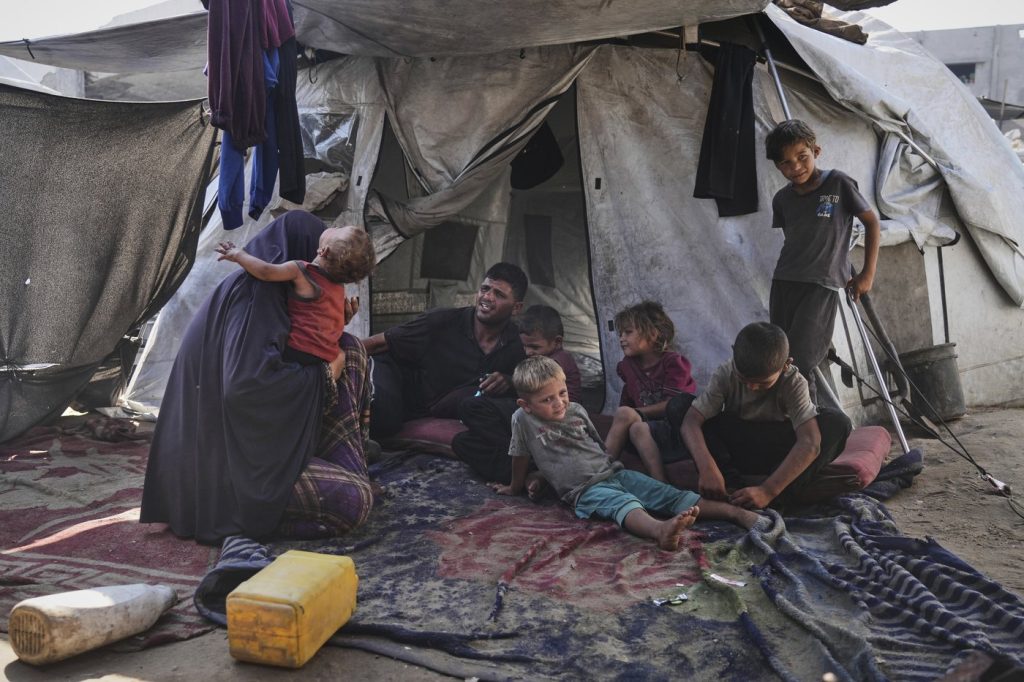DEIR AL-BALAH, Gaza Strip (AP) — In the Gaza Strip, every morning for Abeer and Fadi Sobh, survival hangs by a thread marked by desperate choices. Residing in a tent in a seaside refugee camp after being displaced multiple times, the couple grapples with the haunting question of how to feed their six young children amidst dire circumstances.
The Sobhs have three primary options for accessing food: they might find a charity kitchen open, potentially providing them with a meager pot of watery lentils; they could attempt to navigate crowds clamoring for flour from aid trucks; or, if all else fails, they must resort to begging. Unfortunately, increasing hunger leaves them with fewer viable options, and there are times when, lacking any food entirely, they simply go without. For many like the Sobhs, this struggle has intensified over the past 22 months due to ongoing war and humanitarian crises.
Humanitarian workers emphasize that hunger has escalated remarkably in the Gaza Strip, warning that the “worst-case scenario of famine is currently playing out in the region.” Israel's complete blockade on food and essential supplies for two and a half months beginning in March aimed to exert pressure on Hamas for the release of hostages taken during an attack on October 7, 2023. Although aid flow resumed in May, it remains insufficient, failing to meet the critical needs as outlined by aid organizations.
Moreover, the breakdown of law and order complicates safe food deliveries, with much of the available aid being hoarded or sold at extraordinarily high prices in local markets. The Sobhs’ reality illustrates the widespread suffering throughout the war-torn territory.
A typical day starts with the intense heat of summer inside the tent, where Fadi Sobh, a 30-year-old street vendor, and his 29-year-old wife Abeer struggle to maintain basic hygiene. With fresh water scarce, Abeer gathers seawater for their morning bath, pouring it over their children who attempt to scrub themselves. After tidying up their limited living space, Abeer heads out to beg for breakfast, a process often met with frustration as many days she returns empty-handed.
The family faces relentless hunger. Abeer sometimes manages to mix lentils into water for her baby Hala or receives lentils from neighbors. Abeer expresses the enormity of her distress, stating, “One day feels like 100 days because of the summer heat, hunger, and the distress.”
In search of nourishment, Fadi ventures to a nearby soup kitchen, often accompanied by one of the children. Unfortunately, the kitchen’s resources are limited, and Fadi often returns empty-handed, leaving his children to sleep hungry. Due to an incident where he was shot in the leg a month prior, Fadi has become too weakened to join the chaotic scenes at aid truck distributions, where desperate crowds often clash in their pursuit of limited resources.
Abeer also faces the agonizing choice to compete in these crowds for aid or rely on the charity of others. Occasionally she succeeds; often, she must appeal to fellow recipients for any surviving food, receiving small bags of flour that may allow her to create something for her children.
During the hottest parts of the day, their children remain close to the tent, where their parents try to shield them from the heat, conserving their energy, while potential food sources dwindle. As evening approaches, the children venture out, sometimes prompted to beg from neighbors or search through rubble for scraps to use as cooking fuel.
On these treks, the children learn to identify materials that could be useful, such as paper, wood, or even discarded plastic items. With few possessions left due to multiple displacements, Abeer states her reality succinctly, “I have to manage to get by.”
When luck is on their side, Abeer may manage to prepare a thin lentil stew for dinner. Yet, there are often days when nothing is available, and once again, the family goes to bed hungry. The weight of their suffering takes a toll on Abeer, who feels an unraveling of her strength as she searches for food and water. Amidst the war and unrelenting hunger, she confesses, “If the war goes on, I am thinking of taking my life. I no longer have any strength or power.”











